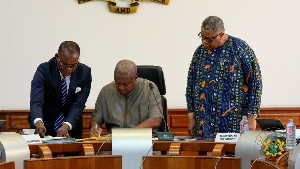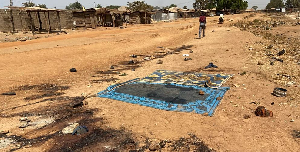Cape Coast, Dec. 29, GNA - The Centre for Environmental Impact Analysis's (CEIA) "fluoride removal treatment system" has won the golden jubilee competition on 'Science, Technology and Innovation' (STI) award of the Council for Scientific and Industrial Research (CSIR).
A statement signed by Mr. Frederick Ato Armah, the Director of Research/Programmes of the CEIA, said the first phase of the Centre's laboratory research on fluoride removal from water sources was adjudged the best after vigorous selection process. It said with this feat, there was the hope that the high fluoride ions found in boreholes in the Bongo District in the Upper East Region as well as parts of the three northern regions would soon be removed to an appreciable level.
The statement explained that the development of the treatment system consists of two phases which are the laboratory investigations and technology transfer materials to the affected communities. "This award vindicates CEIA's commitment to developing low-cost and small scale water technologies that is accessible, affordable and available to deprived communities", it said.
The statement said the result of the first phase, which involves the use of either activated clay, laterite or a combination of the two was now complete with a promising result of between 75.3% and 85.6% of removal of fluoride in the area of study within the acceptable range of 1.5ppm by the World Health Organization (WHO).
Giving a background to the study it said the Community Water and Sanitation Agency (CWSA) in August 2007 asked individuals and scientific research institutions to help find lasting solution to the high fluoride ions found in boreholes in the Bongo District. The statement said research done this year to determine the effects of drinking high fluoridated water in that district showed that about 15,000 people representing 20% of its population of 77,885, suffered from dental fluorosis, a disease which attacks the gums and render the teeth permanently brownish.
It said prior to that the CEIA, whose mission is to protect human health and the environment, had undertaken a project to design a water treatment system, using local materials to facilitate the removal of high levels of fluoride ions from underground water to make it safe for consumption. The statement appealed to the government and its developing partners to assist the CEIA to carry out the second phase which involves pilot testing of the system in the field as well as the transfer of technology to the Bongo District and other affected areas adding that about 45% of the country's population depends on underground water for survival.
General News of Tuesday, 29 December 2009
Source: GNA












